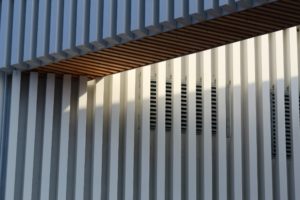Does Natural Building Ventilation Lead to Air Leakage?
 Air leakage can wreak havoc on a metal building, energy bills — and end users’ sanity, too. And, in an effort to keep buildings healthy and sidestep frustrations, engineers and builders everywhere have been working to find ways to stop air leakage in its tracks. One seemingly popular solution, adding increasingly thicker insulation into a space, has carried with it some unwanted side effects. Namely, folks have noticed it leads to moisture buildup and, eventually, mold. At Metallic Products, we believe the solution is fairly simple and straightforward. If you want to keep air leakage at bay, you need to incorporate natural ventilation into your building plans.
Air leakage can wreak havoc on a metal building, energy bills — and end users’ sanity, too. And, in an effort to keep buildings healthy and sidestep frustrations, engineers and builders everywhere have been working to find ways to stop air leakage in its tracks. One seemingly popular solution, adding increasingly thicker insulation into a space, has carried with it some unwanted side effects. Namely, folks have noticed it leads to moisture buildup and, eventually, mold. At Metallic Products, we believe the solution is fairly simple and straightforward. If you want to keep air leakage at bay, you need to incorporate natural ventilation into your building plans.
But, could natural ventilation lead to even more air leakage? The short answer, of course, is no — so long as that ventilation is handled the right way. (Otherwise, we would never recommend it.) The longer answer takes us back to basics with a ventilation principle you probably learned back in high school science class. Read on to dig into the issue.
First Things First: What is Air Leakage?
Air leakage is the uncontrolled — and unwelcome — entry of outside air into your building. Whether due to weaknesses around building joints, rust and deterioration of the materials that make up your building or another culprit altogether, air leakage can make it difficult to adequately regulate temperature and humidity, and can open a space up to potential damage over time.
How Does Natural Ventilation Work?
Around here, we like to think of natural, or unpowered, ventilation as the way your spaces breathe. It involves incorporating strategic openings throughout your metal buildings to encourage healthy airflow, typically with help from ridge vents and louvers and the like. Once incorporated, those openings allow clean air to make its way inside the building, while ushering stale air out. At the same time, that regular airflow helps to keep insulation, sheetrock and other aspects of your building from accumulating excess moisture. (And as you know, moisture does metal buildings no favors.)
Shouldn’t Openings Lead to Air Leakage?
As with most things in the metal building and construction industries, it’s all about your approach. Sure, if you were to simply punch unprotected holes into your roof or leave windows wide open, air leakage would be a given. The metal building accessories designed to aid with such processes, however, have built-in “safeties” included. Your adjustable louvers include operators for easy closure in adverse weather, for instance, while fixed louvers are designed to keep the bad stuff out with no adjustments needed. So long as you’ve got the right accessories and are adequately maintaining your building, you should be in good shape.
Much as with that favorite cooler you take to the beach, your metal buildings need the opportunity to air out. Otherwise, moisture becomes trapped inside — and nobody wins in that scenario. If you have questions on any of the above, please feel free to contact our team. This is an issue that’s pretty important to us, and one we’re working to get word out about. Of course, you’re welcome to contact us about any other related issues, as well. We always enjoy hearing from you.



 Air leakage can wreak havoc on a metal building, energy bills — and end users’ sanity, too. And, in an effort to keep buildings healthy and sidestep frustrations, engineers and builders everywhere have been working to find ways to stop air leakage in its tracks. One seemingly popular solution, adding increasingly thicker insulation into a space, has carried with it some unwanted side effects. Namely, folks have noticed it leads to moisture buildup and, eventually,
Air leakage can wreak havoc on a metal building, energy bills — and end users’ sanity, too. And, in an effort to keep buildings healthy and sidestep frustrations, engineers and builders everywhere have been working to find ways to stop air leakage in its tracks. One seemingly popular solution, adding increasingly thicker insulation into a space, has carried with it some unwanted side effects. Namely, folks have noticed it leads to moisture buildup and, eventually,